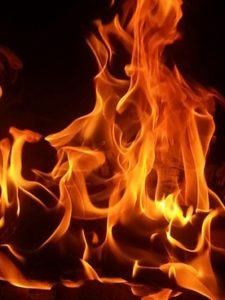 I imagine myself, 2000 years ago. Somehow I managed to escape the Roman pillage of Jerusalem, somehow I managed to escape the deadly rivalry between the Jews. I look back for a moment. My whole world is up in flames. My eyes are watering from the smoke. The smell is of death. I see the ashes, our Holy Temple smoldering. All is destroyed. There has been so much death. I think of all the materials that were used; cedars from Lebanon, the gold, silver, copper and brass expertly crafted into the utensils needed for accepting the ritual sacrifices. I think of all the hours of careful and tedious work that went into weaving the drapes and the garments of the priests. I remember the exquisite colors of the drapes; sky blue, dark red, crimson. I remember the holy priests with their pure white robes adorned with a breastplate set with precious gems. All was gone. All destroyed. Who would lead us? How would we repent? Where would we bring our peace offerings or our offerings of gratitude? Where would we rejoice? Where would we find the Almighty?
I imagine myself, 2000 years ago. Somehow I managed to escape the Roman pillage of Jerusalem, somehow I managed to escape the deadly rivalry between the Jews. I look back for a moment. My whole world is up in flames. My eyes are watering from the smoke. The smell is of death. I see the ashes, our Holy Temple smoldering. All is destroyed. There has been so much death. I think of all the materials that were used; cedars from Lebanon, the gold, silver, copper and brass expertly crafted into the utensils needed for accepting the ritual sacrifices. I think of all the hours of careful and tedious work that went into weaving the drapes and the garments of the priests. I remember the exquisite colors of the drapes; sky blue, dark red, crimson. I remember the holy priests with their pure white robes adorned with a breastplate set with precious gems. All was gone. All destroyed. Who would lead us? How would we repent? Where would we bring our peace offerings or our offerings of gratitude? Where would we rejoice? Where would we find the Almighty?
Monthly Archives: July 2021
Between Diaspora and Homeland by Peter Eisenstadt and Ayala Emmett

In 2021, the United States ended four years of an autocratic President and Israel just formed a coalition that ousted a similarly autocratic PM. Much has been made of the similarity and affinity between the two, yet this discussion is not a rehashing of the rise and fall of these leaders. Rather, what is most striking is that almost ninety percent of the Jews in the world are now living in Israel and the United States and that both countries have played a major role in changing Jewish history almost beyond recognition.
The history of the Jewish diaspora, as it existed for two millennia, is no more. The Jews are no longer spread out across the nations. The Jewish presence in Eastern Europe and in the Middle East (with the notable exception of Israel) is vestigial. Jews in the United States are the large remaining example of the Jewish diaspora, yet with unprecedented cultural, social, and political participation. American Jews embraced English as their language, they no longer are seriously concerned about fitting in and do not have to worry about legal, cultural, or economic barriers to their full citizenship. While the United States, in 2021, is far from a paradise of inclusion, it is hard to deny that it has been good for the Jews in a way that has never existed before in the history of Jewish diaspora.
Joseph Eisenstadt by Peter Eisenstadt

On July 3rd, 2021, my father, Joseph Eisenstadt, would have turned one hundred years old. He hasn’t been with us for over twenty years. He was a good dad. I am proud to have been his son. He did not have a terribly easy life, a life whose early years were dominated by the discontinuities between Jewish life in Eastern Europe and in the United States. I don’t know if it is quite a myth, but there is a widespread belief that when Eastern European Jews came to the United States, the transition was relatively easy. There are exceptions, and the Eisenstadts were exceptions. Dad was born in Manhattan, but his parents were newcomers to America, arriving around 1920. My dad’s older brother, Sol, was born a few years before in Slutsk in Belarus. His was also a hard life. He told the story, which I think in some ways epitomized his somewhat unhappy life, that when leaving from Slutsk to America in an ox-cart, when he was an infant, he fell out of the cart, and no one noticed that he wasn’t there until my grandparents had traveled a verst or so, and then they went back to retrieve him, finding him lying in the road.